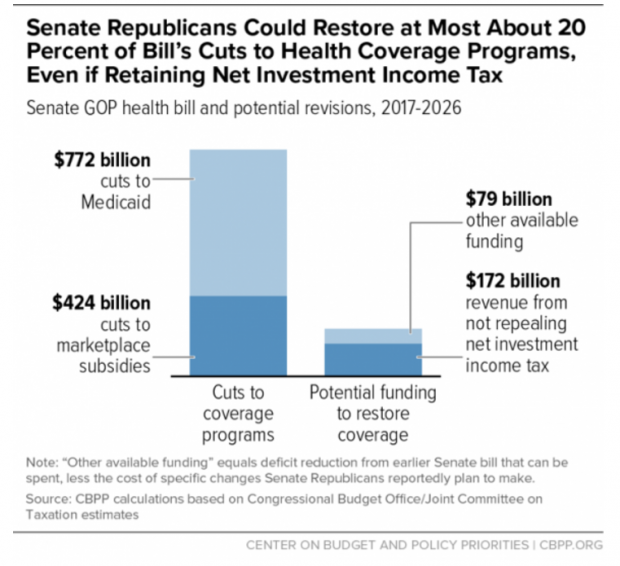Republicans appear to be fighting a losing battle in their effort to repeal and replace the Affordable Care Act. Public unhappiness with the Senate proposal grew over the July 4 recess, and the prospects for a deal that will satisfy both the party’s right wing and its less doctrinaire members may well be slipping away from Senate Majority Leader Mitch McConnell.
A new analysis from the Center on Budget and Policy Priorities suggests that the biggest problem the GOP faces in its efforts to transform an unpopular piece of legislation into something that at least 50 of the 52 Republican senators can supports comes down to a question of math.
Related: Here’s What a Bipartisan Health Care Deal Might Look Like
Republicans were dismayed when the Congressional Budget Office determined that, as written, the GOP bill would have effects similar to those of a bill that passed the House of Representatives -- specifically, that more than 20 million fewer Americans would have health insurance within a decade of the bill becoming law.
Nevertheless, Republicans moved forward in an effort to find changes to the legislation that would make it more palatable to its reluctant members. More than two weeks after that CBO report came out, though, there appears have been little progress, and according to the CBPP analysis, the sticking point is really the question of resources. The amount of money that Republicans are willing to dedicate to health care spending simply isn’t enough to achieve coverage levels acceptable to the members of the party who look most vulnerable in coming elections.
This is partly revealed in the extent of the proposed cuts. The bill would effectively eliminate the expansion of Medicaid to childless adults put in place under the Affordable Care Act by vastly increasing the cost of the program to the states. It would also cap spending on Medicaid even for individuals eligible under pre-ACA rules.
Additionally, the bill proposes the elimination of various taxes put in place by the ACA, which would result in the loss of hundreds of billions of dollars in revenue, much of it earmarked for supporting the insurance markets.
Related: How Republicans Can Save Their Health Care Plan — and the Nation’s Health
The end result is that, absent a major overhaul in the bill that reverses its preference for tax cuts over health care spending, the GOP plan is going to result in millions of Americans who would otherwise have had insurance having none.
“Some of the bill’s major flaws are unfixable purely as a matter of math — even if senators adopt a proposal to drop one of the bill’s high-income tax cuts,” write CBPP’s Jacob Leibenluft and Aviva Aron-Dine.
“Savings from dropping that tax cut, plus other available resources that could restore some of the cuts to health coverage programs, only amount to about one-fifth of the bill’s $1.2 trillion in cuts to programs that help low- and moderate-income people afford health insurance,” they find.
That’s proving to be an increasingly intractable problem for GOP leaders faced with a miniature rebellion from within their Senate caucus. Led primarily by the more moderate members of the party, the pushback against McConnell and his leadership team looks likely to continue until major changes are made.
If that happens at all, it will simply introduce a new set of problems for McConnell, who will face the prospect of a fresh rebellion from Senate conservatives, who are already concerned that the bill doesn’t go far enough toward meeting their goals of completely destroying the ACA.






